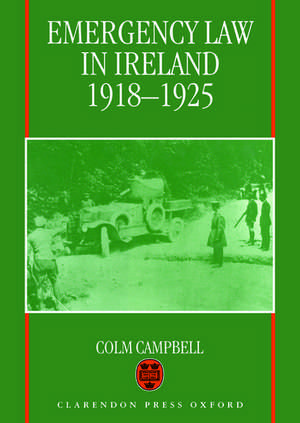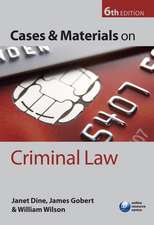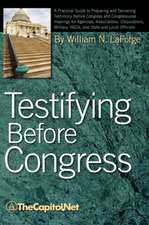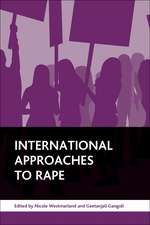Emergency Law in Ireland 1918-1925
Autor Colm Campbellen Limba Engleză Hardback – 14 sep 1994
Preț: 415.22 lei
Preț vechi: 488.50 lei
-15% Nou
Puncte Express: 623
Preț estimativ în valută:
79.45€ • 83.18$ • 65.74£
79.45€ • 83.18$ • 65.74£
Carte tipărită la comandă
Livrare economică 05-19 aprilie
Preluare comenzi: 021 569.72.76
Specificații
ISBN-13: 9780198256755
ISBN-10: 0198256752
Pagini: 454
Ilustrații: line figures, maps, tables
Dimensiuni: 163 x 237 x 31 mm
Greutate: 0.8 kg
Editura: Clarendon Press
Colecția Clarendon Press
Locul publicării:Oxford, United Kingdom
ISBN-10: 0198256752
Pagini: 454
Ilustrații: line figures, maps, tables
Dimensiuni: 163 x 237 x 31 mm
Greutate: 0.8 kg
Editura: Clarendon Press
Colecția Clarendon Press
Locul publicării:Oxford, United Kingdom
Recenzii
`This is a book that is both scholarly for the lawyer and historian and compelling for the general reader.'Irish Independent Weekender
`His book, in which the more theorectical legal discussion is firmly underpinned by a wealth of statistical and other factual material, can be strongly recommended as a valuable addition to our understanding of this period and the continuing problems which confront the legal systems in both islands in dealing with terrorism.'The Irish Times
`could hardly be better timed ... This book should be required reading for John Major, Sir Patrick Mayhew, and the delegates to the Dublin Forum for Peace and Reconciliation'Bulletin of the Committee on the Administration of Justice
It is a rewarding experience in the light of a depressing history in which the author teases out impressively the subtle gradations of, and ingenuity in, constructing regimes of legal repression. He has performed an ardous and delicate task in disentangling the complex and over-lapping network of courts and the legal provisions governing them.
It is a timely moment for the publication of Colm Campbell's thorough and detailed study of the use of emergency powers in the eight crucial years in Irish history which led to the partition of the island, after a period of war and civil war ... This is an impressive book, carefully researched and well written. It is very much a legal history, and therefore does not devote much time to discussing the wider impact of the emergency regime. None the less, it is a work both lawyers and historians of Ireland will find to be of great value.
the most esoteric, treatingthe history of violent times through the special mechanisms of the rule of law applied to them in all British Ireland, the Free State, and six-county Northern Ireland. By the very nature of its methodical enterprise, it could hardly by anything but impressive. With its footnotes, elegant graphs, tables and appendices, it is itself a giant hostorical footnote, a monument to the devoted academic's industry.
'Dr Campbell, in great detail and with an immensely impressive grasp of the relevant logistics, portrays the manner in which jurisdictions which sometimes were successive and at other times paralleled each other jockeyed for position within the narrow insular framework of Ireland...The book is rich in analytical quality and is quite probably the first readable treatment of the republican left.'
'a detailed, highly formal analysis of emergency powers that assesses their impact upon the outcome of political conflicts. Its great value is the use of archival resources to study the implementation of emergency law in three jurisdictions...For those who are interested in the modulation of legal forms under extreme stress, this book can be recognized without hesitation...Campbell has produced a study of value.'
'masterly study...There can be little doubt that Dr Campbell's book, with its careful analysis of the political and military imperatives, will be a standard reference for its subject as well as a boon to researchers in this field...it is a work in which anyone remotely interested in human rights, both on a national and international scale, cannot fail to find valuable insights.'
`His book, in which the more theorectical legal discussion is firmly underpinned by a wealth of statistical and other factual material, can be strongly recommended as a valuable addition to our understanding of this period and the continuing problems which confront the legal systems in both islands in dealing with terrorism.'The Irish Times
`could hardly be better timed ... This book should be required reading for John Major, Sir Patrick Mayhew, and the delegates to the Dublin Forum for Peace and Reconciliation'Bulletin of the Committee on the Administration of Justice
It is a rewarding experience in the light of a depressing history in which the author teases out impressively the subtle gradations of, and ingenuity in, constructing regimes of legal repression. He has performed an ardous and delicate task in disentangling the complex and over-lapping network of courts and the legal provisions governing them.
It is a timely moment for the publication of Colm Campbell's thorough and detailed study of the use of emergency powers in the eight crucial years in Irish history which led to the partition of the island, after a period of war and civil war ... This is an impressive book, carefully researched and well written. It is very much a legal history, and therefore does not devote much time to discussing the wider impact of the emergency regime. None the less, it is a work both lawyers and historians of Ireland will find to be of great value.
the most esoteric, treatingthe history of violent times through the special mechanisms of the rule of law applied to them in all British Ireland, the Free State, and six-county Northern Ireland. By the very nature of its methodical enterprise, it could hardly by anything but impressive. With its footnotes, elegant graphs, tables and appendices, it is itself a giant hostorical footnote, a monument to the devoted academic's industry.
'Dr Campbell, in great detail and with an immensely impressive grasp of the relevant logistics, portrays the manner in which jurisdictions which sometimes were successive and at other times paralleled each other jockeyed for position within the narrow insular framework of Ireland...The book is rich in analytical quality and is quite probably the first readable treatment of the republican left.'
'a detailed, highly formal analysis of emergency powers that assesses their impact upon the outcome of political conflicts. Its great value is the use of archival resources to study the implementation of emergency law in three jurisdictions...For those who are interested in the modulation of legal forms under extreme stress, this book can be recognized without hesitation...Campbell has produced a study of value.'
'masterly study...There can be little doubt that Dr Campbell's book, with its careful analysis of the political and military imperatives, will be a standard reference for its subject as well as a boon to researchers in this field...it is a work in which anyone remotely interested in human rights, both on a national and international scale, cannot fail to find valuable insights.'












